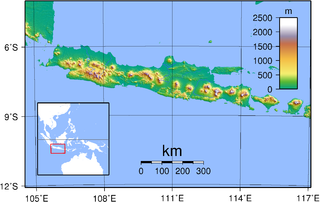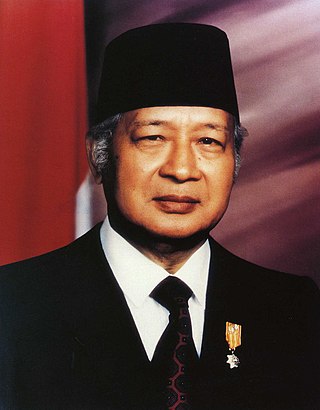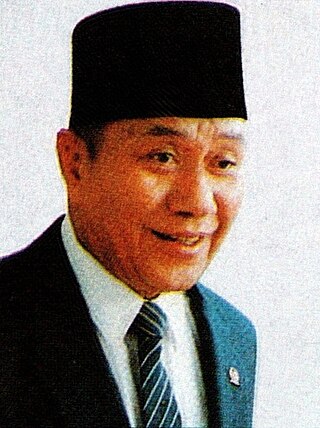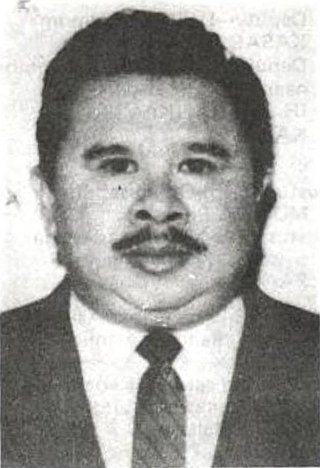
The history of Indonesia has been shaped by its geographic position, natural resources, a series of human migrations and contacts, wars and conquests, as well as by trade, economics and politics. Indonesia is an archipelagic country of 17,000 to 18,000 islands stretching along the equator in Southeast Asia. The country's strategic sea-lane position fostered inter-island and international trade; trade has since fundamentally shaped Indonesian history. The area of Indonesia is populated by peoples of various migrations, creating a diversity of cultures, ethnicities, and languages. The archipelago's landforms and climate significantly influenced agriculture and trade, and the formation of states. The boundaries of the state of Indonesia match the 20th-century borders of the Dutch East Indies.

Java is one of the Greater Sunda Islands in Indonesia. It is bordered by the Indian Ocean to the south and the Java Sea to the north. With a population of 156.4 million people, Java is the world's most populous island, home to approximately 56% of the Indonesian population. Indonesia's capital city, Jakarta, is on Java's northwestern coast.

Suharto was an Indonesian military officer and politician, who served as the second and the longest serving President of Indonesia. Widely regarded as a military dictator by international observers, Suharto led Indonesia as an authoritarian regime from 1967 until his resignation in 1998 following nationwide unrest. His 31-year dictatorship is considered one of the most brutal and corrupt of the 20th century, as he was central to the perpetration of mass killings against alleged communists, ethnic Chinese, irreligious people and trade unionists.

The Java War or Diponegoro War (ꦥꦼꦫꦁꦢꦶꦥꦤꦼꦒꦫ) was fought in central Java from 1825 to 1830, between the colonial Dutch Empire and native Javanese rebels. The war started as a rebellion led by Prince Diponegoro, a leading member of the Javanese aristocracy who had previously cooperated with the Dutch.

Adam Malik Batubara was an Indonesian politician, diplomat, and journalist, who served as the third vice president of Indonesia from 1978 until 1983, under President Suharto. Previously, he served in a number of diplomatic and governmental positions, including Speaker of the People's Consultative Assembly from 1977 to 1978, Speaker of the People's Representative Council from 1977 to 1978, Foreign Minister of Indonesia from 1966 until 1977, and president of the United Nations General Assembly from 1971 until 1972.

Sri Sultan Hamengkubuwono IX (Hanacaraka: ꦯꦿꦶꦯꦸꦭ꧀ꦡꦟ꧀ꦲꦩꦼꦁꦑꦸꦨꦸꦮꦟ꧇꧙꧇, often abbreviated as HB IX was an Indonesian politician and Javanese royal who was the second vice president of Indonesia, the ninth sultan of Yogyakarta, and the first governor of the Special Region of Yogyakarta. Hamengkubuwono IX was also the chairman of the first National Scout Movement Quarter and was known as the Father of the Indonesian Scouts.

Sarwo Edhie Wibowo was an Indonesian military leader and the father of Kristiani Herrawati, the former first lady of Indonesia, and the wife of President Susilo Bambang Yudhoyono and also the father of Chief of Staff Pramono Edhie Wibowo. As an army colonel, he played a direct role in directing troops during the Indonesian killings of 1965–66, in which more than half a million Indonesian civilians died. With Suharto's blessing, Wibowo initiated the slaughter. Later, he served as Chairman of the BP-7 center, as Indonesia's ambassador to South Korea, and as governor of the Indonesian Military Academy.
Anthony Reid is a New Zealand-born historian of Southeast Asia. His doctoral work at Cambridge University examined the contest for power in northern Sumatra, Indonesia in the late 19th century, and he extended this study into a book The Blood of the People on the national and social revolutions in that region 1945–49. He is most well known for his two volume book "Southeast Asia in the Age of Commerce", developed during his time at the Research School of Pacific Studies, Australian National University in Canberra. His later work includes a return to Sumatra where he explored the historical basis for the separate identity of Aceh; interests in nationalism, Chinese diaspora and economic history, and latterly the relation between geology and deep history.

General (Ret.) Amir Machmud was an Indonesian military general who was an eyewitness to the signing of the Supersemar document transferring power from President Sukarno to General Suharto.

Hartono Rekso Dharsono, often known as HR Dharsono, was a prominent general in the early years of General Suharto's New Order regime. He served as the first secretary-general of ASEAN. In his later years, he publicly opposed Suharto.
Merle Calvin Ricklefs was an American-born Australian scholar of the history and current affairs of Indonesia.

Raden Ayu Siti Hartinah, also known as Siti Hartinah Soeharto or Tien Soeharto, was the First Lady of Indonesia from 1967 until 1996. She was the wife of second Indonesian president, Suharto.

Ali Murtopo was a prominent Indonesian general and political figure during the first half of General Suharto's New Order regime.

Sumitro or Soemitro was a prominent Indonesian general in the early years of General Suharto's New Order before suddenly falling from grace in January 1974 after the Malari incident.

The acting presidency of Suharto followed the transition to the New Order in which Army General Suharto assumed presidential powers to "restore" law and order following the now-disputed attempted coup which led to anti-communist purges. The term lasted from 12 March 1967 until 27 March 1968, when Suharto was officially inaugurated as the definitive President of Indonesia.

The Dutch East Indies, also known as the Netherlands East Indies and Dutch Indonesia, was a Dutch colony with territory mostly comprising the modern state of Indonesia, which declared independence on 17 August 1945. Following the Indonesian War of Independence, Indonesia and the Netherlands made peace in 1949. In the Anglo-Dutch Treaty of 1824, the Dutch ceded the governorate of Dutch Malacca to Britain, leading to its eventual incorporation into Malacca (state) of modern Malaysia.

Gombong is a town in Kebumen Regency, in the southern part of Central Java, a province in Indonesia. The town has 50,300 inhabitants at the 2020 Census. The total land area is 19.48 km2 (7.52 sq mi). Local people speak Banyumasan, a dialect of Javanese.

Suharto was the second President of Indonesia, having held the office for 31 years from 1967 following Sukarno's removal until his resignation in 1998.
Pertamina Central Hospital is a state owned hospital located in Jakarta, Indonesia. It is one of the largest and best-equipped hospitals in the country, and was opened in January 1972 as a major project of the Suharto regime. It is managed by Pertamina Bina Medika, a subsidiary of the state-owned oil company Pertamina.

Moenadi was an Indonesian military officer and politician who served as the Governor of Central Java between 1966 and 1974. He had previously served in the military, and was a subordinate officer of Suharto.
















